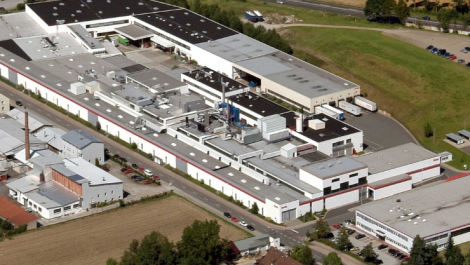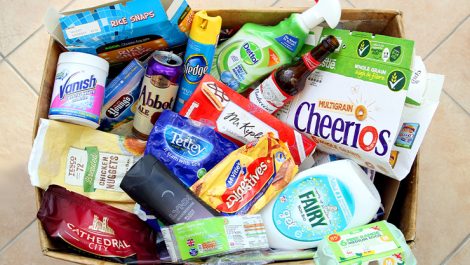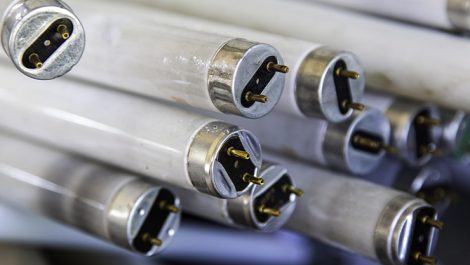For the past several weeks nothing has been certain and we’ve all had to live our lives on a day-to-day basis. But it seems that there is one thing we can all be sure about, the world we emerge back into is not going to be the same as the one we left behind.
Society as a whole will have to adjust to new things like social distancing, the death of the handshake and perhaps masks becoming ubiquitous on our streets. But what about our industry in particular? Digital Printer asked several of the UK’s leading printers to peer into their crystal balls and try to predict what working life is going be like when the dust finally settles.
Lance Hill is managing director at 8 Days a Week, a Nottingham-based printer which had just moved into inkjet technology, installing a Xerox Baltoro, when the lockdown struck. When asked what he expects things to look like when this pandemic is over, Mr Hill said:
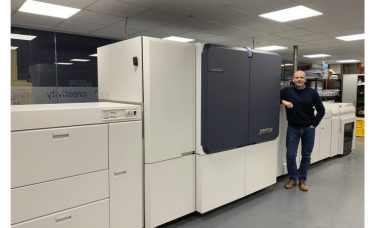
Lance Hill had only recently taken delivery of a Xerox Baltoro when the lockdown struck
‘Businesses will look at the sectors they are exposed to, especially those that have a narrow focus. We are heavily ingrained in pharmaceuticals and healthcare so on that front we are very busy, but we also do a lot with garden centres and that has slowed right down.
‘People will review their strategies, it is natural that one or two large companies make up a large amount of your customer base, this is nobody’s fault, but I do think that it is something people will try harder to avoid.’
‘I also think there is a real opportunity here for direct mail. People are all working from home and getting screen fatigue. What we need is for everyone to consider the bigger picture and not slash marketing budgets. Personalised direct mail could really come into its own if people continue to spend more time at home.’
Remote working
This seems perfectly plausible, 8 Days a Week’s staff are working remotely wherever possible and this is a trend Mr Hill expects to continue, ‘Once we are out of this situation I think remote working will be here to stay. If you are disciplined it can be very efficient and the culture of people needing to be on site to do their jobs is nonsense.
‘Obviously there are people who need to be on the shop floor, but even in print there are jobs which can be done remotely. Some people may find it hard to adjust but technology these days means that it is very doable. With social distancing likely to remain in place for some time, and everyone being very aware of costs, wastage and efficiencies, I also expect to see people ask themselves whether it’s worth travelling for things like meetings, especially when we all know we can handle these things via video calls.’
This is a view echoed by Nicole Spencer, operations director at Hull-based RMC Digital Print. Ms Spencer told Digital Printer, ‘Before the virus we often had sales reps drop in and see us, sometimes unannounced, I can’t see this being the same in the future. I would question if it is a beneficial use of their time and, with continued virus fears, is certainly an unsafe practise. I can see these kind of meetings and updates being done remotely in future.’

Nicole Spencer is hardly devastated about the death of the handshake
Events
Ms Spencer is also the president of the Fespa UK Association and she sees similar trends prevailing when it comes to events. ‘Many more events may become virtual with things like printer demonstrations being done online rather than people investing both their time and finances in attending shows,’ she continued.
‘I think that will actually give some suppliers a better return on investment as they will only get companies that are interested in their products attending. It will also give people a chance to ask questions as the demonstration is happening rather than having to wait for crowds to dissipate.
‘Although, trade shows are an excellent way of networking and also seeing things you didn’t know you wanted to see so I am sure they won’t disappear completely. They might just be in a different format for a while.’
Naturally Ms Spencer stressed how ambiguous things currently are, saying, ‘It is very uncertain as to what we will return to. I hear a lot of companies talking about ‘business as usual’ or ‘when we return to normal’. Personally, I can’t see a return to anything like normal this year and doubt most businesses will operate exactly the same as before.’
Though she was confident of one thing, ‘In terms of meetings I do believe this will be the death of the handshake. It’s always struck me as a fairly awkward formal thing to do anyway and I can’t see what we achieve from it other than potentially sharing germs, bacteria and viruses.’
Investments
Paul Brough is the managing director of direct mail specialist bakergoodchild. The Birmingham-based company hit the headlines recently when it became one of the first companies in the UK to install both the Xerox Iridesse and the Xerox Baltoro.
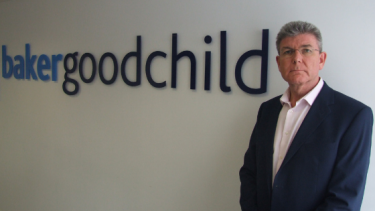
Paul Brough says bakergoodchild will continue to invest
Investing in new technology has always been important to Mr Brough and that isn’t something he sees changing, despite the current situation. ‘We always look to be more efficient and offer cutting edge products and services,’ Mr Brough explained. ‘We always keep an eye on that market, keeping ourselves abreast of new developments and that isn’t going to change.’
This goes for software investments as well, with the MD pointing out that, ‘It is more apparent now than ever that we need to become more efficient, the pressure is on.’
Like RMC and 8 Days a Week, bakergoodchild has adopted remote working and Mr Brough is keen to stress how well his company has adapted. ‘We’re quite an office focused business, but what struck me was how quickly we all adjusted. People have learned to work from home where possible and video conferences and things like that have become normal.’
In a similar vein Mr Brough sees webinars becoming more popular and more prevalent. ‘I’ve always avoided those,’ he laughs, ‘perhaps a little set in my ways. But with the situation around events so uncertain and social distancing being a factor I can certainly see webinars coming to supplement many of our industry events.’
Web-to-print
For Steve Wenlock, managing director of Leicester-based Flexpress, one of the biggest changes will be to the way printers interact with their customers. He said, ‘It’s going to be harder for companies to maintain the same personal relationships they had with clients so I think there’s likely to be even further growth in web-to-print. To win a share of the market, newer entrants lacking imagination or differentiation will revert to under-pricing to win work, putting margins under further pressure. Entrepreneurial printers will find clever or niche markets to bolster profits.’
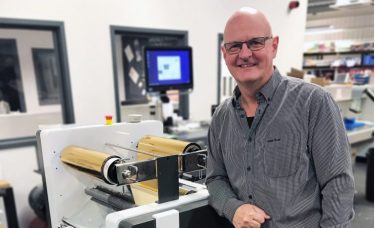
Steve Wenlock of Flexpress expects growth in web-to-print
In terms of day-to-day working practices Mr Wenlock, who installed the UK’s first DuSense Digi Foil in March, added, ‘There is going to be a lot more emphasis on social distancing and hygiene. Possibly hand sanitiser stations at doors, people working further apart and regular cleaning routines. It also wouldn’t surprise me if workers were legally obliged to wear masks whilst at work too. Some of this is good practice anyway, but on the basis it takes around 30 days to change a habit I think some of it will stick but people will forget other parts. Nothing was ever going to be the same after 9/11 but it didn’t take long for them to start building skyscrapers again!’
Regarding supply chains Mr Wenlock said though some impact was inevitable, he had hopes the effect would be minimal. He did however anticipate that companies that have been supportive throughout the crisis would be rewarded, saying, ‘I do think there’ll be a huge tendency for companies to switch loyalty to those suppliers who have supported them through problems.’
Longevity
When asked about changes to daily life, the first thing head of Route 1, Mark Young, said was ‘I think the changes we’re seeing now are going to last a long time. When we’re finally out of lockdown we’ll still be standing 2m apart and we’re going to be really focussed on our hygiene for a very long time.
‘Print can be very important here, getting messages to people is going to be more important than ever, and smaller companies are going to be investing in this messaging that never did before. We’re already changing our product range to reflect this.’
The Rotherham-based business, which recently installed the UK’s first Landa nanographic press and an MGI JetVarnish 3D Evo 75 embellishment press, has got as many people as possible working remotely, though unlike some of his peers Mr Young doesn’t seem entirely sold on the concept. ‘We’ve got everyone that can remote work doing so,’ he said, ‘we’re all going to have to phase back to normality and that’s going to take a while. Home working is something we’d need to consider for the future but really, we want to get our business back to normal as soon as possible.’
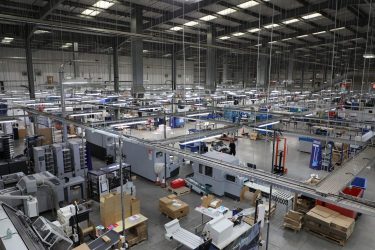
Mark Young wants Route 1’s Yorkshire premises to be bustling again as soon as possible
He is positive however that the impact of the virus won’t stop print in its efforts to encourage young people to enter the industry, ‘As I said I think print has a real future through the other side of this. Companies that can offer a young person a career and an opportunity to learn and develop skills will have no shortage of applicants. It’s going to take the industry some time to get recruitment really pumping but when that happens there will be plenty of work and plenty of candidates.’
The good news is that, though all of the printers Digital Printer spoke to expect there to be significant changes to the way the industry will operate in the future, there remains a great deal of positivity about print and what it can accomplish. The entire sector should be proud of the way it has come together during this crisis and there are definitely many things in print to be proud of.

